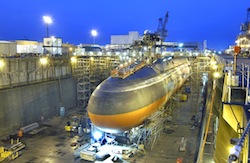311 Nuclear Weapons Are All We Need, Say Air Force Strategists
May 24, 2010
Featured Image
Today's top nuclear policy stories, with excerpts in bullet form.
Stories we're following today, Monday, May 24, 2010:
An Arsenal We Can All Live With - The New York Times [link]
- The Pentagon has now told the public, for the first time, precisely how many nuclear weapons the United States has in its arsenal: 5,113. That is exactly 4,802 more than we need.
- We have calculated that the country could address its conceivable national defense and military concerns with only 311 strategic nuclear weapons.
- Considering that we face no threat today similar to that of the Soviet Union 45 years ago, this should be more than adequate firepower for any defensive measure or, if need be, an offensive strike.
- And this would be true even if, against all expectations, our capacity was halved by an enemy’s surprise first strike. In addition, should we want to hit an enemy without destroying its society, the 311 weapons would be adequate for taking out a wide range of “hardened targets” like missile silos or command-and-control bunkers.
- We need a nuclear arsenal. But we certainly don’t need one that is as big, expensive and unnecessarily threatening to much of the world as the one we have now.
Revealed: How Israel Offered to Sell South Africa Nuclear Weapons - The Guardian [link]
- Secret South African documents reveal that Israel offered to sell nuclear warheads to the apartheid regime, providing the first official documentary evidence of the state's possession of nuclear weapons.
- The "top secret" minutes of meetings between senior officials from the two countries in 1975 show that South Africa's defence minister asked for the warheads and Shimon Peres, then Israel's defence minister and now its president, responded by offering them "in three sizes".
- The two men also signed a broad-ranging agreement governing military ties between the two countries that included a clause declaring that "the very existence of this agreement" was to remain secret.
- A spokeswoman for Peres today said the report was baseless and there were "never any negotiations" between the two countries. She did not comment on the authenticity of the documents.
Clinton: UN Security Council Should Take Up North Korean Aggression - Politico [link]
- On a trip to Asia as tensions mount in the Korean peninsula, Secretary of State Hillary Clinton has strongly endorsed South Korea’s call for the U.N. Security Council to take up the issue of North Korean aggression.
- “I will be working with Ambassador Rice and our Korean counterparts, as well as Japan, China, and other U.N. Security Council member states to reach agreement on a way forward in the council,” Clinton said.
- “The President has directed his military commanders to coordinate closely with their Republic of Korea counterparts to ensure readiness and to deter future aggression,” White House spokesman Robert Gibbs said in a statement Sunday.
- It's unclear as yet if China, North Korea’s only ally, will support the call to take up U.N. Security Council action on the Cheonan incident, a point Clinton acknowledged.
At West Point, Obama Offers New Security Strategy - The Washington Post [link]
- President Obama on Saturday offered a glimpse of a new national security doctrine that distances his administration from George W. Bush's policy of preemptive war, emphasizing global institutions and America's role in promoting democratic values.
- In a commencement speech to the graduating class at the U.S. Military Academy at West Point, Obama pledged to shape a new "international order" based on diplomacy and engagement.
- "Yes, we are clear-eyed about the shortfalls of our international system. But America has not succeeded by stepping outside the currents of international cooperation," Obama said.
- "The international order we seek is one that can resolve the challenges of our times," he said.



